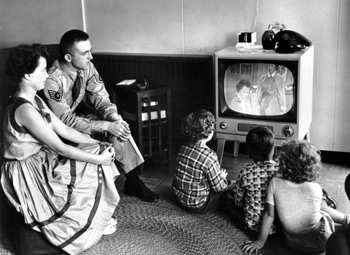
What ever happened to TV’s internet revolution?
Connected TVs are about to jumpstart the nascent IPTV and VOD sectors, perhaps even with radical new online services. But some of the UK industry’s key figures, at Tuesday’s Westminster Media Forum, lined up to give a conservative prediction – that the biggest opportunity is merely time-shifting…
Richard Halton, CEO, YouView
“Television will thrive because it gets connected – not because the web will displace today’s linear viewing. Twenty-six hours per week are linear – we don’t believe that’s going to change.”
Tess Alps, CEO, Thinkbox
“I’ve got a hundred-quid bet with somebody – it won’t ever be more than 20 percent of viewing that will be non-linear. Young peope don’t plan ahead.
“Some people will want more functionalities on their TV – but I don’t think it will be a large market. There will only be a small group of people who want Twitter on their screen, most people will want TV.”
Richard Lindsay-Davies, CEO, Digital TV Group
“The Germans are spending €600 for a great (Humax) PVR, but only 30 percent of them are actually being connected.
“Virtually the entire market in the UK over the next 10 years will all be connected TV – unfortunately, we might find 70 percent of them are not connected.
“Normal television is sustaining reasonably well. DVD and Blu-Ray sales are holding up rather well – so maybe (the TV-VOD revolution) will happen slower than we think.”
David Bloom, commercial director, IP Vision
“This is an evolution, not a revolution. Even the simplest changes in the market take a long time to (become popular).
“Twenty-six hours a week is (currently) broadcast television. It’s a very, very effective form of delivery. VOD will fill in round the edges on that, in terms of premium, catch-up, things I can’t get via broadcast.
“Broadcasters will adapt – there’ll be a lot more live television. Uou can’t beat something that’s live.”
Peter Johnson, CEO, ATVOD
“Viewing habits, for many, have not changed as quickly as the technology or the possibilities. The overwhelming majority of viewing remains linear television. The numbers of VOD viewing – catchup and archive – remain small.
“It’s rather different for those who have been formed in this brave new world … Large-scale common experiences still matter – and I think they will continue to matter.”
David Cockram, senior consultant, Oliver & Ohlbaum
“The assumptions that VOD will destroy linear viewing have now passed.
“VOD viewing is likely to account for only one, two, three or four percent of viewing by 2015, even allowing for the rollout of YouView and VOD services on Sky. It is, thus far, not cannibalising linear viewing.”